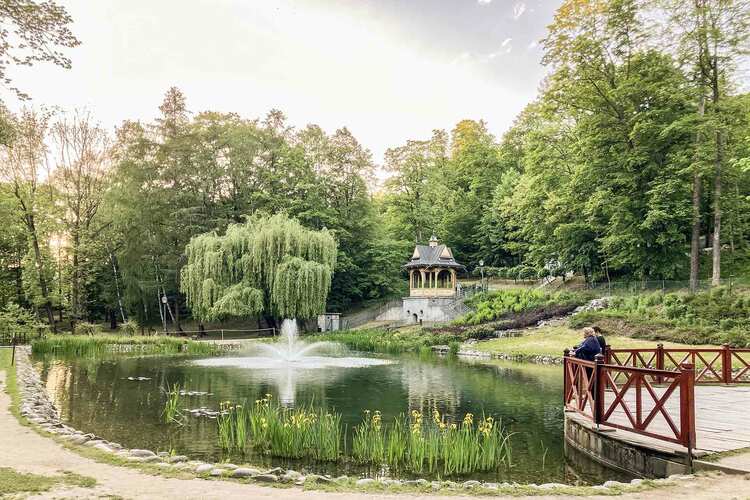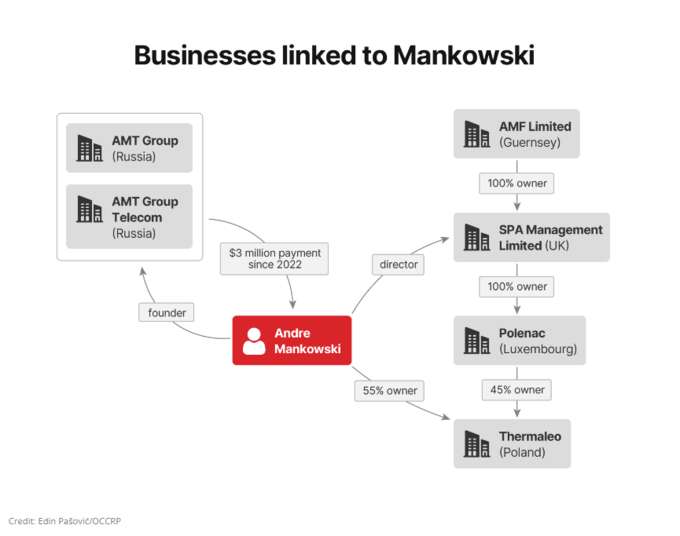Polish businessman makes millions from firm that deals with Putin’s Russia

Since Russia’s full-scale invasion of Ukraine, the name of blue-blooded Polish businessman Andre Mankowski has disappeared from the website of the Moscow-based IT company AMT Group, where he was formerly listed as president. Yet reporters found the EU citizen has continued to make money from the firm, which does business with Putin’s sanctioned regime.
Two months after Russia began its full-scale invasion of Ukraine in February 2022, Andre Mankowski’s name disappeared from the website of AMT Group, the technology company where he was formerly listed as president.
The businessman, who is the descendant of a Polish aristocrat, founded the Moscow-based firm in the mid-1990s. It has since become one of Russia’s largest IT systems integration companies, scoring a host of government contracts – including with units of the Ministry of Defense, the intelligence service, and the security services – and winning the trust of the administration of Russian President Vladimir Putin.
As Russia became mired in its war in Ukraine, sparking a massive expansion of U.S. and EU sanctions, the change on AMT Group’s website suggested Mankowski, now 77 years old, might be stepping back. As a Russian company, AMT Group was free to do business with sanctioned clients – but Mankowski, a Polish and French citizen, was not.
However, a joint investigation by OCCRP partners iStories and FRONTSTORY.PL found that Mankowski has continued to earn money from the firm as it serviced big-hitting clients linked to Putin and the Russian state, even after many of them were subject to U.S. and EU sanctions.
Reporters from iStories discovered that recent clients of AMT Group include sanctioned banks, an electronics manufacturer for the Russian defense industry, a nuclear munitions manufacturer, and financial institutions run by Putin’s closest friends.
According to financial data obtained by iStories, between 2022 and 2024 Mankowski himself received at least 250 million rubles ($2.8 million at the current exchange rate) from AMT Group. He also received 27 million rubles ($300,000) from an affiliated company called AMT Group Telecom. The data doesn’t detail the purpose of the payments, including whether they consisted of dividends or some other arrangement.
While Mankowski was listed as the owner of AMT Group in Russian and UK commercial registries in 2019, the firm does not disclose its shareholders to the public and reporters could not confirm its current ownership status.
If Mankowski were to be the beneficial owner of a company that supports Russia’s war machine, that would be a violation of EU sanctions, said Kinga Redłowska, an expert on illicit finance with the Royal United Services Institute (RUSI) think tank.
The EU can also impose sanctions on “an individual who supports the Russian regime directly or through business entities that it controls or of which it is the beneficial owner,” she said. “If that doesn’t happen for some reason, Poland could include such a company on its sanctions list.”
How or where Mankowski has invested money earned through the profitable AMT Group is unclear. But he and his family are best known in Poland for pouring funds into a passion project in the country’s south: the historic spa town of Szczawnica.

A park owned by the Mankowski family in Szczawnica.
In 2005, a management company now chaired by Mankowski took charge of the town’s resort, which once belonged to his grandfather but had been nationalized after World War II. Over the past 20 years, the management company, called Thermaleo, has sunk millions into property development in the mountain town.
When reached for comment, Thermaleo denied that any investment in the resort town came from AMT Group, saying that it has been financed by Mankowski’s “assets,” without specifying further.
“No funds for investment in Szczawnica came from AMT Group or its companies. The funds came directly from the assets of Andrzej Mankowski. Whether they were his savings or came from current income was of little importance,” the company told FRONTSTORY.PL through a lawyer.
Mankowski and AMT Group did not respond to detailed questions sent by reporters.
From Crepes To Kremlin Contracts
Born Andrzej, Mankowski now uses the name Andre on company documents outside Poland.
According to family lore, despite his aristocratic background he once scraped a living as a young man on the streets of Paris. “When Jędrek [diminutive for Andrzej] left, he was earning money in Paris making crepes in a street stall,” one of his relatives told FRONTSTORY.PL.
But his fortunes soon changed. After finishing his business and technical studies in France, Mankowski landed a job in 1974 in the fledgling computer industry with the French company Bull, according to his archived biography on AMT Group’s website. He later rose up the ranks of the leading U.S. firm Digital Equipment Corporation (DEC), whose computers were famously smuggled into the Soviet Union and copied to create the first Soviet computers.
Around the time of the USSR’s collapse, Mankowski became DEC’s commercial director in Russia, before going on to set up AMT Group, which was registered in France in 1994 and in Russia in 1995.
By the time Russia invaded Ukraine in 2022, the company had a long track record of winning lucrative government contracts, including for entities under Russia’s Defense Ministry, the military unit of the Federal Security Service (FSB), and the Russian Intelligence Service (SVR).

Russia’s Ministry of Defense.
Between 2004 and 2022, AMT Group earned at least 17.5 billion rubles ($473 million) through contracts with state-owned entities and state-controlled organizations in Russia, including banks and companies, according to procurement data.
AMT Group’s Journey to the Heart of the Russian State
AMT Group’s first major government contract listed in available public procurement data dates back to 2004, when the Russian Federal Treasury employed the firm to create a communications network, in a deal worth more than seven billion rubles (over $269 million).
The company has been contracted to work in some of the most sensitive areas of the Russian state ever since. Between 2009 and 2013 it supplied routers, encryption support, and security elements of vote-counting systems to entities under the Federal Informatization Center of Russia’s Central Election Commission. It also supplied mobile phone-blocking equipment to the military unit of the FSB and equipment for the Federal Guard Service, which provides protection for the political elite.
The company supplied software for the Interior Ministry’s main internal army control center, and implemented a radio network control system for branches of the state broadcaster.
Mankowski appears to have had personal connections with senior Russian officials at some of the state organizations where AMT Group won business contracts.
Documents leaked to the International Consortium of Investigative Journalists show Mankowski co-owned the British Virgin Islands-registered Stenson Corporation in 2006 with Sergey Yurchuk, the then 22-year-old son of a major general with the Russian Customs Service, who held a senior role in a unit responsible for IT security. Between 2007 and 2020, Mankowski’s AMT Group earned more than half a billion rubles (around $5.5 million at the current exchange rate) from contracts with the Customs Service and its structures.
AMT Group also signed contracts worth around two billion rubles (approximately $21 million at the current exchange rate) with the Moscow City Government’s IT department between 2011 and 2022, a time when Kirill Gusarov, who had previously worked for Mankowski at AMT Group, headed the department’s procurement section.
Yurchuk and Gusarov did not respond to requests to comment.
Loyalty To Sanctioned Clients
Since Russia’s full-scale invasion of Ukraine, Mankowski has received 50 payments amounting to the equivalent of $3 million from AMT Group and a related Russia-based company called AMT Group Telecom, according to financial data seen by iStories. The payments, more than 90 percent of which came from AMT Group, ranged from 400,000 to 26 million rubles (approximately $4,000 to $290,000 at the current exchange rate).
The data also shows that in the five years prior to the invasion, Mankowski had been paid a total of 814 million rubles (around $9 million at the current exchange rate) by both companies.
While Mankowski is publicly listed as owning 49 percent of the affiliated AMT Group Telecom , AMT Group’s ownership is opaque. Mankowski’s UK-based firm Interworking Data Com was, prior to its dissolution in 2019, listed in public documents as owning 100 percent of the company. Since then, AMT Group’s owners have not been named. The company is listed as a “non-public joint stock company,” a form of Russian entity which is not obliged to disclose ownership information publicly.
What is clear is that AMT Group has prospered from contracts with sanctioned entities since the 2022 invasion, including a developer of nuclear warheads, a producer of technology for military aircrafts, and Russia’s largest insurer.
AMT Group’s Deals with Russia’s Sanctioned Companies and Banks
Reporters found that AMT Group has received millions of dollars from the following sanctioned entities since the start of Russia’s full-scale invasion of Ukraine in February 2022.
- Four days after the invasion, AMT Group received more than 400,000 rubles (around $6,000) for technical support for a “corporate network quality control system” from the state-owned manufacturer Ryazan Instrument-Making Enterprise, which produces radar stations and other technology for military aircrafts and has been under U.S. sanctions since 2016.
Ryazan Instrument-Making Enterprise belongs to Russia’s state-owned corporation Rostec, which oversees research and development of the country’s military technology and is headed by Putin’s longtime friend Sergei Chemezov, who has been under U.S. and EU sanctions since 2014. The transfer to AMT Group came via Novikombank, which primarily runs defense industry transactions and was sanctioned by the U.S. just days earlier. - In July 2022, the All-Russian Automation Research Institute, a developer of nuclear warheads on the European and U.S. sanctions list since the outbreak of the war, paid AMT Group more than one million rubles ($19,000) in a “goods supply” contract. Reporters were unable to determine the details.
- Russia’s largest insurer SOGAZ, under EU sanctions since the full-scale invasion, paid AMT Group over three million rubles ($55,000) in 2022, including for contracts to maintain its telecommunications network. Yuri Kovalchuk, another sanctioned friend of Putin, has a large stake in the company, according to Forbes.
- AMT Group has also received more than 300 million rubles (around $3.5 million) from state-controlled VTB since the bank was sanctioned in the first half of 2022. Of that total, 42 million rubles (almost $480,000) was a down payment for the AMT Group to supply software and hardware made by U.S. computer security company Gigamon. (When reached for comment, Gigamon’s vice president of marketing said the company “fully complies with all US sanctions programs” and ceased all sales into Russia after the 2022 invasion).
- State-controlled and sanctioned Otkritie Bank, which was taken over by VTB in 2022, paid AMT Group more than 130 million rubles (around $1.9 million) in 2022, including for supplying and providing technical support for equipment made by the US company Cisco. After the war broke out, Cisco announced it was leaving Russia, but was previously a longstanding official partner of AMT Group in Russia.
- SMP Bank, which has been subject to U.S. sanctions since 2014, paid AMT Group more than 700,000 rubles (around $10,000) in 2022 for contracts from 2021. One of the payments was for technical and service support for the hardware and software complex of Check Point Software Technologies, a U.S.-based IT security company. (A representative from Checkpoint said the company “strictly adheres to all international sanctions regulations and policies” and that the company had no internal records of the services AMT Group provided to SMP Bank in 2021).
SMP bank was previously owned by sanctioned oligarchs and friends of Putin, Arkady and Boris Rotenberg, who recently sold the bank to state-owned Promsvyazbank.
Ryazan Instrument Enterprise, All-Russian Automation Research Institute, SOGAZ, Cisco, Otkritie Bank, and VTB did not respond to requests to comment.
The Mankowski Family’s Debt-hit Spa
The Polish spa town of Szczawnica, nestled in the lush Pieniny mountains and famed for its curative mineral-rich waters, seems a world away from Moscow.
But one of its biggest employers is Andre Mankowski’s family, which has poured millions of dollars into the town since 2005, when it became the majority shareholder of the town’s historic spa, a sweeping resort featuring hotels, cafes, and health facilities.

Andre Mankowski’s grandfather Count Adam Stadnicki had acquired the resort in 1909, but it was nationalized after World War II. Over time, it began to deteriorate and in the late 1990s, Stadnicki’s heirs began to demand its return.
In 2005, the family reached a settlement with Poland’s government: the majority of the shares in the spa, and the extensive plots and properties that belonged to it, would be handed over to a management company called Thermaleo chaired by Andre Mankowski’s son at the time, on the condition that the company invest 10 million Polish złoty ($3 million) in the site.
Since then the company has put much more into Szczawnica than originally promised, with Thermaleo and its subsidiaries now running a range of real estate properties in the town, including a string of high-end hotels, a sanatorium offering health treatments, a “water pump room” where the town’s mineral waters can be consumed, and a horse stud farm.

Financial statements show the investments have not been particularly profitable, suggesting that outside funding would be necessary to keep the businesses afloat.
Since Thermaleo acquired Szczawnica Spa in 2005, it has often ended the financial year in debt, as have its subsidiary companies. In its latest financial statements for 2022, Thermaleo showed a loss of more than PLN 7 million ($1.7 million).
The company also notes in its financial statements that it “is not making a profit and is dependent on various forms of recapitalisation from the Shareholders’ portfolio,” without going into further detail.
Polish local newspaper Tygodnik Podhalański has previously quizzed the Mankowski family over the source of the money flowing into the spa town. A 2007 article describes how, when asked by phone about the origin of the funds for Szczawnica, Andre Mankowski answered “laconically, talking about investment funds. When we ask for specifics, he refuses to answer.”
After Russia’s invasion of Ukraine, the paper again asked Thermaleo if Andre Mankowski’s AMT Group had invested in Poland. The company’s board of directors assured the paper that it was not.
When reached for comment by FRONTSTORY.PL, Thermaleo again rejected any financial links with AMT Group in a statement the company’s lawyer provided on behalf of the board.
“Andrzej Mankowski makes no secret of his views on the war in Ukraine, describing it as a catastrophe for both the Ukrainian people and all of Europe,” the company said, adding that he has funded reconstruction efforts in Ukraine and supported Ukrainian refugees in France. The family also reportedly offered free accommodation and food to some Ukrainian families seeking refuge in Szczawnica in the early days of the war.
When reporters tried to dig deeper into the source of Thermaleo’s investments, they discovered the spa is owned by a chain of companies structured like a matryoshka doll, making it difficult to trace where the funding truly comes from.

Based on the latest publicly available documents, reporters established that 95 percent of Szczawnica Spa’s shares belong to Thermaleo. The company’s 2023 list of shareholders show that Andre Mankowski and his son Christophe hold 55 percent of the shares (Christophe owns less than one percent), while the rest are held by a company called Polenac, registered in Luxembourg in 2020.
According to Polenac’s latest company report from 2022, it has no employees.
But Polenac is in turn owned by a London-registered firm called SPA Management Limited, who lists Andre Mankowski as director – and its sole employee.
The last link in the chain is the most opaque: SPA Management Ltd’s sole shareholder is a company called AMF Limited, registered in the Channel Islands tax haven of Guernsey. AMF does not disclose information about its finances and owners.
However, when asked by reporters about the beneficial owner of SPA Management and AMF Limited, Thermaleo said:
“The beneficial owner of all entities involving Andrzej Mańkowski is Andrzej Mańkowski alone.”
The companies closer to the top of the chain have also reported heavy debt. By 2022, SPA Management’s debt to parent company AMF amounted to more than £92 million ($111 million).
When queried by reporters, Thermaleo said this was the amount that had been invested across Szczawnica. “This value is consistent with the value of capital (shared and supplementary) in Thermaleo, therefore, with a small margin of error, it can be confirmed that this value is the value of broadly understood investments in Szczawnica,” it said in a statement.
Read more similar news:
Comments:
comments powered by Disqus

































